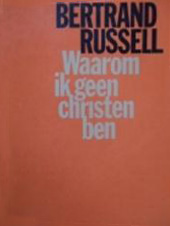Why I Am Not a Christian

Why I Am Not a Christian is an essay by the British philosopher Bertrand Russell. Originally a talk given 6 March 1927 at Battersea Town Hall, under the auspices of the South London Branch of the National Secular Society, it was published that year as a pamphlet and has been republished several times in English and in translation.[1]
Contents
Russell begins by defining what he means by the term Christian and sets out to explain why he does not "believe in God and in immortality" and why he does not "think that Christ was the best and wisest of men", the two things he identifies as "essential to anybody calling himself a Christian". He considers a number of logical arguments for the existence of God and goes into specifics about Christian theology. He argues ad absurdum against the "argument from design", and favors Darwin's theories.
Russell also expresses doubt over the historical existence of Jesus and questions the morality of religion, which is, in his view, predominantly based on fear.
History
The first German edition was published in 1932 by Kreis der Freunde monistischen Schrifttums, a monist association in Dresden inspired by Ernst Haeckel. In 1957 Paul Edwards preferred Russell over the then more trendy Ludwig Wittgenstein and published the essay and further texts referring to the background of The Bertrand Russell Case. Russell had been denied a professorship in New York for his political and secular views and his tolerance for gay and lesbian behaviour among students. Some countries banned the book, including South Africa.[2] The enhanced version has been republished in various editions since the 1960s. The New York Public Library listed it among the most influential books of the 20th century.[3]
Similarly titled works by other authors
- Why I Am an Atheist is an essay by Indian revolutionary Bhagat Singh, published in 1930.
- Why I Am Not a Conservative is an essay by Austrian School economist Friedrich Hayek, published in 1960.
- Why I Am Still a Christian is a book by Catholic theologian Hans Küng, published in 1987.
- Why I Am Not a Muslim, by Ibn Warraq, is a 1995 book also critical of the religion in which the author was brought up — in this case, Islam. The author mentions Why I Am Not a Christian towards the end of the first chapter, stating that many of its arguments also apply to Islam.
- Why I Am Not a Hindu, a 1996 book in a similar vein by Kancha Ilaiah, an activist opposed to the Indian caste system.
- Why I Am Not a Secularist (2000) by William E. Connolly[4]
- Why I Am Not a Scientist (2009) ISBN 0-520-25960-2, by biological anthropologist Jonathan M. Marks
- Why I Am Not A Christian, by historian and philosopher Richard Carrier
- Why I Am Not a Communist, by Karel Čapek, a 1924 essay in Přítomnost magazine.
- Why I Am Not A Property Dualist, an essay by John Searle in which he criticises the philosophical position of property dualism.
- How I Stopped Being a Jew, is a 2014 book by Israeli historian Shlomo Sand.
- Why I Am a Christian, is a 2003 book by English author John Stott.
- Why I Am a Hindu, is a 2018 book by Indian author Shashi Tharoor.
References
- ^ Chapman, Simon. "A book that changed me". British Medical Journal. Retrieved 27 August 2007.
- ^ "Literarische Umschau" - E. Katzmann, Karl Ude [ed.]: Welt und Wort. Literarische Monatsschrift, 14 (1959), 200.
- ^ New York Public Library website
- ^ William E. Connolly, Why I Am Not a Secularist, Minneapolis: U of Minnesota Press, 1999, ISBN 9780816633319, pp. 5ff
External links
- Text of essay at the Bertrand Russell Society website
- Annotated text
